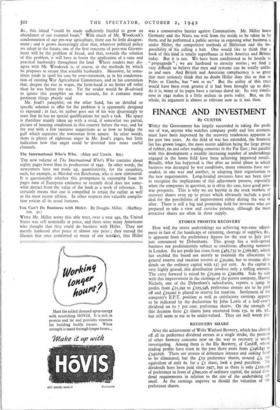FINANCE AND INVESTMENT
By CUSTOS WHILE the Government has largely succeeded in taking the profit out of war, anyone who watches company profit and loss accounts must have been impressed by the recovery tendencies apparent in the past two years. As the field of war has extended, the financial list has grown longer, the most recent addition being the large group of rubber, tin and other trading concerns in the Far East ; but parallel with this development a steadily increasing number of undertakings engaged in the home field have been achieving improved results. Broadly, what has happened is that after an initial phase in which business was deranged by war conditions, many concerns have suc- ceeded, in one way and another, in adapting their organisation to the new requirements. Long-headed investors have not been slow to recognise the implications of this adjustment process, especially when the companies in question, as is often the case, have good post- war prospects. This is why we see buying in the stock markets of recovery shares even up to prices which obviously include a good deal for the possibilities of improvement either during the war or after. There is still a big and promising field for investors who are prepared to take a view and exercise patience, although the most attractive shares are often in short supply.
STORES PROFITS RECOVERY
How well the stores undertakings are achieving war-time adjust- ment in face of the handicaps of rationing, shortage of supplies, &c., is apparent from the preliminary figures for the year to July 31st just announced by Debenhams. This ,group has a well-spread business not predominantly subject to conditions affecting turnover in London. Its net profit has risen from £485,735 to £566,897, which has enabled the board not merely to maintain the allocations to general reserve and taxation reserve at £50,000, but to resume divi- dends on the ordinary capital with 12} per cent. As the capital is very highly geared, this distribution involves only a trifling amount. The carry forward is raised by L25,000 to L290,689. Side by side with this improvement in the earnings of the parent company, Harvey Nichols, one of the Debenham's subsidiaries, reports a jump in profits from £21,292 to £105,548, preference arrears are to be paid off and Lio,000 is placed to reserve for taxation; Settlement of the company's E.P.T. position as well as satisfactory earnings appears to be indicated by the declaration by John Lewis of a half-year's dividend on its 7 per cent. preference shares. On the strength of this decision these LI shares have recovered from 55s. to 16s. 9d., but still seem to me to be under-valued. They are well worth par.
RECOVERY SHARE
After the achievement of Wells Watford Brewery, which has cleared off all its preference dividend arrears at a single stroke, the position of other brewery concerns now on the way to recovery is worth investigating. Among them is the Ely Brewery, of Cardiff, whose trading profits have risen in the past three years from £246,845 to £540,626. There are arrears of debenture interest and sinking fund to be eliminated, but the Do preference shares, around £3, the equivalent of only 6s. for a Li share, look a good purchase. No dividends have been paid since 5927, but as there is -only- k110,000 of preference in front of £69o,000 of ordinary capital, the actual divi- dend requirements in relation to the size of the undertaking are small. As the earnings improve so should the valuation of the preference shares.


























 Previous page
Previous page